#I don't know if it's just because Good Omens is fermenting in my brain at the moment
Explore tagged Tumblr posts
Text
Hear me out, David Tennant as the 14th Doctor gives off more Crowley vibes than Ten vibes.
#I don't know if it's just because Good Omens is fermenting in my brain at the moment#But I feel like I have a point#good omens#doctor who#david tennant
38 notes
·
View notes
Note
So I was re-reading the Fish meta just now trying to figure out where taramasalata would go in all that, when the thought occurred -- I don't know if there are many sushi restaurants in the South Downs, so A. and/or C. might get into doing home-made stuff (e.g. from 'Sushi For Dummies or smth); do you think Ineffable Husbands speak would make a distinction between restaurant vs home-made sushi?
Hi, love! Your Asks always make me hungry lol. 💕 What I think your ask has to do with bacon, Hamlet, coffee, the "fomenting" of 597 AD, The British Museum Cafe, the kimchi that Brenda so desperately needed to bitch about to Her Ron in S1, and a hidden language joke related to Crowley's 1941 hat under the cut. (Sorry this one took a minute-- your Ask got my brain percolating a bit. 😊)
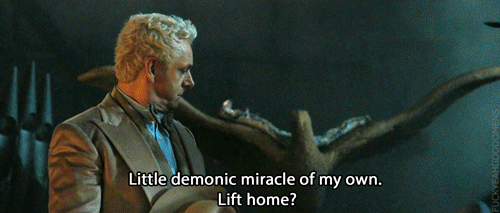
One of the reasons why I think it's sushi that Crowley & Aziraphale chose to go out for on their sneaky dinners circa 2008 is that sushi is predominantly made up of fish (usually raw but not always) wrapped up in fermented rice. I'm not an expert in the history of sushi but one thing I have learned about it is that it was originally invented as a way to preserve fish for longer back in ancient times when there wasn't a way to keep fish chilled. Then, it was called narezushi.
Narezushi involved salting fish after skinning and gutting it, then letting it ferment for a few months in the salt, before then removing the salt and stuffing and covering it with rice, and fermenting for even longer. Fish would be stored in rice for the better part of the year and, much of the time, the rice wouldn't actually be eaten afterwards-- just the fish. Over time, it evolved into the sushi that we know today, which is still made with a kind of fermented rice. Fermentation is the same process used to make alcohol and several different kinds of bread-- including black bread and sourdough, the two Crowley and Aziraphale are coded as being.
In bread, the yeast in the fermenting process is what causes the dough to rise and in alcohol, it's the ethanol fermentation that turns the sugars in the fruit or grain into alcohol. We know that bread, fish, and alcohol are all common sex euphemisms in different ways in their speak so what's with the focus on fermentation?
I think it's a couple of things at once. One is that fermentation is an analogy for arousal. Another is that, in talking about sushi and fish-- things like pickled herring, etc., as well that also are about preserving fish-- there's also a romantic sense to it. They've been together a long time. Food that can be made to age-- wine, cheese, pickled and preserved fish and other food, etc..-- is food that lasts a long time, if not as long as they do. It's bits of the past carrying into the present. Still another aspect to it would be a nod to delayed gratification. If a food involves fermentation and can last longer than most other food, it's analogous to aspects of things like edging that are alluded to in a half-dozen or so different scenes.
The last reason, though, could be because it reminds them of 597 AD and the brief bit of ferment/foment/frumenty wordplay confusion.
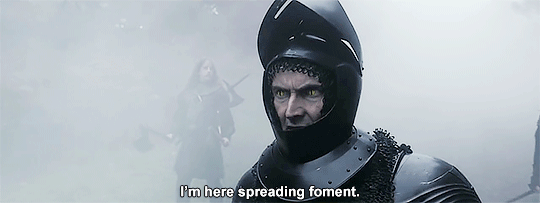
I wrote about this at one point I think already but the jokes in this scene are based around the fact that they both keep saying or thinking of words that sound like "ferment." Crowley says he's "spreading foment"-- a word that does mean spreading discord but also is used to describe oils/potions applied with warm water. Foment is bath soaks and Crowley is super uncomfortable in that suits and knows Aziraphale is too so he's all let's quit and go take a bath.
Aziraphale gets that Crowley is wordplay-flirting with him (showing up and posing with "and you have found your [little] death" made that a bit clear) but he is confused by what the hell foment is because they usually flirt in food terms. Aziraphale thinks Crowley is going for a food euphemism-- "is that some kind of porridge?"-- because there was a new porridge called frumenty that had come up around the same time and that sounds like a word that Aziraphale could see Crowley using-- it's food, it's phonetically linked to fruit, even!-- but Crowley clarifies that, no, he was using foment. What is extra-confusing is that both words link to ferment and the process of fermentation, which is already a thing for them.
Crowley makes his meaning more clear and they figure out what each other is saying but it's a fun scene because Aziraphale just assuming that Crowley was trying to food-flirt with him then makes this one of the scenes in the series that make it more obvious that they are, in fact, doing just that. (Otherwise, you have to think that Aziraphale thought Crowley got dressed in a knight's outfit and schlepped around a damp woods spreading actual porridge and why on Earth would Aziraphale think that was an actual answer to what Crowley was up to? lol)
Later scenes suggest that it's in 597 AD as a result of the ferment/foment/frumenty conversation that Crowley and Aziraphale experimented and figured out the truth about their ability to do miracles and this is suggested in a few places, like we looked at in other metas, as to be how they figured out they could have all the sex without killing each other. That... seems like it would place fermentation in a pretty revered position in Ineffable Husbands Speak lol so whether they're getting sushi from a restaurant or making it at home, fish with a history related to fermentation seems like it would be top of the list for sexy dinner night.
One of the other jokes about fermented food in the series is about one of the most famous examples of it-- kimchi-- and it's the one in the scene where Aziraphale possesses Madame Tracy during one of her "psychic sessions." Crowley and Aziraphale refer to possession in highly-sexualized terms, to the point that when Aziraphale appeared to Crowley after being discorporated and they started talking about Aziraphale needing to possess someone to get back to Earth, the "receptive body", etc. innuendo is just blatant and not at all coded.
Brenda chose to take the time Aziraphale gave her to speak to her husband to go on to Ron about how scandalized she was to be served Korean food at the wedding she recently attended and it's when she starts to talk about "the kimchi" being brought out, that is when Ron finally flips out and loses it at her from beyond the grave, right? Poor Ron never got any fermentation in life and he's not about to keep being tormented in death. 😂 Not exactly an example of true passion, Brenda and Her Ron were...
After the whole interlude is over, we hear King of All Fermenting Aziraphale pause and then dryly remark: "Wasn't that touching?" Hilarious in its own right and a comment that Crowley would have found even funnier, since neither touching sentiment nor physical touching seemed to be very prevalent in the sad marriage of Brenda and Ron. They could have done with eating a bit more kimchi.
I do think Crowley & Aziraphale would differentiate between homemade and restaurant sushi, if only for the fun with messing with the words-- because I think they subtly actually already are from some other scenes in the series.
We heard in S2 that one of their alternate rendezvous spots is The British Museum Cafe, which is pretty hilarious from an euphemistic standpoint. They had to pick a place that they could be said to have just been in at the same time should they get caught and also museums are the indoor versions of public parks in spycraft stories but we've also seen them use restaurant/cafe/place that provides food euphemistically for a lover. The two of them meeting each other in secret in the cafe of The British Museum when they are literally older than dirt is just very funny. What kind of cafes are they to each other? The kind related to the stuff that's been here forever-- the ones that provide coffee and lunch and snacks amongst all the fossils and ancient art.
Cafe and restaurant-- like rendezvous-- are also obviously French loaner words in English; they are French words that have been absorbed into common use in English. When you say them in a sentence, you are, technically, speaking two languages at once. There is a technical name for that and it's related to something that lives in plain sight in the bookshop so we'll come back to that in a second...
Cafe is also obviously the French word for coffee. Coffee, in GO, seems to live at the symbolic intersection of sex and America. (A very complicated intersection lol.) There are other posts around these parts about coffee and its role in the American Revolution and all the American symbolism in Give Me Coffee or Give Me Death in S2. Coffee as a beverage in the whole food-and-drink thing, though, is a drink produced by grinding together coffee beans, which are actually seeds, which really feels like another meta at this point so getting to that Seeds of Destruction post soon...
Crowley and Aziraphale are actually also drinking coffee after wine at The Ritz in S1 and Crowley is being pouty about Aziraphale having put him on half-rations of late while in his angel feelings and not talking to him about those feelings as much as Crowley would like when he tells Nina this is what he wants to drink:
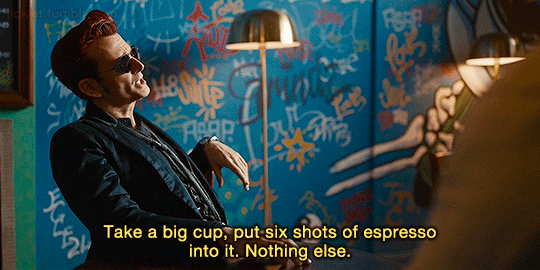
Share them frozen peas, Aziraphale... Anyway, if that's restaurants and cafes, then do they also already have a concept of home? I think they do and we can see it in some of the words they're using.
The word home itself has a rather interesting history, especially from a GO-related perspective. It's related to the root words of ham and hem (food/seamstressing.) You can see some of that linguistic history still remaining to this day in what we call a little human settlement that isn't quite as big as a full-on town-- a hamlet.

Yes, really lol. Of all the plays for them to have attended, eh? Yet another reason for it having been Hamlet, in addition to the content of the play itself. (My favorite being that Burbage is mixed in louder around them at The pangs of despised love/the law's delay/the insolence of office and the spurns... Yep.) Whickber Street could also be described as a hamlet within London Soho and Aziraphale is largely responsible for having developed it. But what about the bookshop itself? Is it a home for both of them within the hamlet?
You've undoubtedly heard the idiom "home is where you hang your hat" and we've seen in several scenes that the in-universe explanation for Terry Pratchett's hat hanging on Aziraphale's hatstand in the bookshop is that it's Crowley's hat from 1941. This isn't just a visual, literal execution of that idiom but also a different joke related to the hatstand, not the hat, and wordplay.
One, old-time-y word for a coat rack/hat stand like Aziraphale has in the bookshop is a portmanteau. This word means a half-dozen different things, including also a large, old-fashioned trunk that would have been used as a suitcase. While these are literal things-- physical objects-- the word portmanteau also has meanings when it comes to languages.
In linguistics, the word portmanteau can be used to refer to two different kinds of language things, both of which involve words that are blended together.
When we use words from more than one language in a sentence together, the sentence could be defined as a portmanteau. Most of us make these kinds of sentences without consciously intending to do so and fairly often-- especially with relation to food. Like the use of the words restaurant and cafe in sentences spoken in English that we mentioned above.
Aziraphale is actually making a pun about portmanteaus in S2 when he uses jardiniere in his French sentence because the word jardiniere exists in French but is also a loaner word in English, where it has come to mean a garden box/flower planter. It's French that was adopted into English, which altered its meaning a bit, and then Aziraphale puts it back into the sentence he's speaking-- which is all otherwise in French-- but using its English-language-derived meaning to form the innuendo. He's made a portmanteau in the process.
This isn't the only linguistic meaning of portmanteau, though. The other is actually the even more commonly used one and it's a word that is created out of mashing up two or more words together. One example is popsicle (pop, as in soda pop + icicle = popsicle) which is the American word for one of the desserts they buy during the body swap scene in the park. Another relevant to Crowley and Aziraphale is breakfast (break + fast, the meal they're getting-- no matter the time of day lol-- when it's been a minute since they were together but which, ironically, it doesn't seem they actually have a lot when it comes to literal food itself, since there's suggestion that they're not usually together in the mornings.)
A portmanteau-the-hat-stand is also an umbrella stand... The S2 posters with the umbrellas... Frou frou cocktails with little umbrellas... All of these things-- hats, umbrellas, wings, etc..-- provide the same function as another word we've heard recently:

They're all canopies... and so is the bookshop, really, as it's a form of shelter that keeps them safe and under the roof of which they've probably had their share of vavoomy kisses... The portmanteau where Crowley hangs his hat in the bookshop-- a place full of words in books and wordplay with his partner-- is a physical representation of wordplay that relates to the word used to describe different words and languages blended together, like how they're trying to do together as best as they can through the bonkers circumstances we've seen them in.
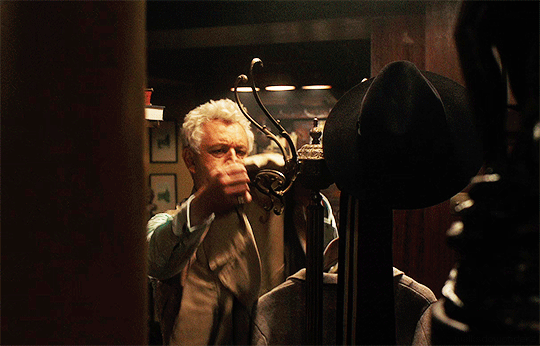
But we're not quite done with a concept of home yet because let's go back to ham for a minute... So, we talk about fish a lot in these here parts but not so much about jokes related to meat and since ham is now home, let's get into the meat and potatoes of it. (*groan* I know... that one was beneath me lol.)
In S2, meat became a whole damn thing after we had the ox ribs scene, right? The first food Aziraphale ever ate was (a lot of) meat, which feels right and just for the self-proclaimed The Southern Pansy... but meat had been lingering around in the wordplay already for a bit-- including in God's intro to Crowley & Aziraphale in S1.
The word meat is, of course, a homophone for the word meet.
Just as God uses "quarter" twice in her opening monologue in 1.01 and encourages us to look at multiple meanings of words in doing so, She uses "meeting" twice in her intro to the St. James' Park scene that serves as a paragraph of language lessons in Ineffable Husbands Speak. The word is used in the first and last sentences and with relation to the multiple meanings of clandestine meetings that are happening on and under the surface-- secret agents, secret lovers, and secret language within the world of both of those.
While there's the secret agent comparison happening, there's also the other connotation of a secret meeting and God encourages us to bring in historical context to what's happening on the surface by saying that St. James' Park "is and always has been" the best place in London for a clandestine meeting. It doesn't take more than a brief Google search to learn that St. James' Park was originally one of the most notorious hookup parks of history-- making it then already amusing in S1 when God then finishes her intro by saying that Crowley and Aziraphale "have been meeting here" in St. James' Park "for quite some time." After S2, though, this is even funnier.
Meeting here, did you say, God?

Probably also worth mentioning that another way to have said that sentence is "Crowley and Aziraphale have been coming here for quite some time" since you go to a meeting and... yeah lol.
Or, in S2, when Aziraphale flirts with Crowley during the party they're having in their home by telling him that he was hosting a business meeting and then holds out a tray of vol-au-vents in a knowing imitation of how Crowley once did with the ox ribs.
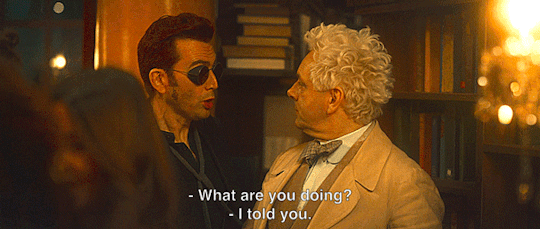
As we all know, ham is meat that comes from a pig. When you crisp that meat up, it's called something else-- bacon. The word bacon comes from the same root words as that of the word back-- a word with two meanings that cross together when it comes to a sense of home made with a romantic partner.
We have bacon coming from the word back as a noun-- referring to a part of the body-- but the word back is also a verb that refers to returning to a place. This is referred to more frequently as coming back and now we've, well, come back to wordplay around the verb to come... not unexpectedly lol. Your home is the place where you hang your hat and to which you keep returning.
Crowley leaves the house during the 2.01 argument and then returns and dramatically announces: "I'm back."
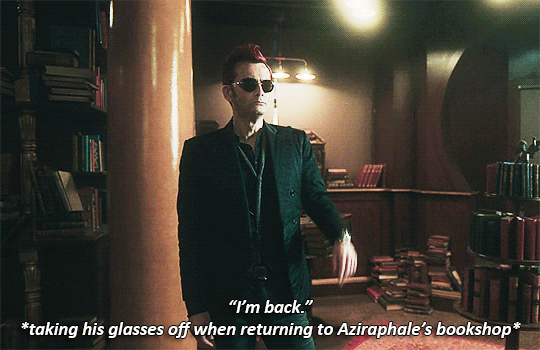
The bacon has come back home, should Aziraphale wish for any makeup meating at any time. Glasses off and everything.
Aziraphale drolly replies: "Yes. I can see that."
"I can (container, often for food) see (homophone: sea) that (contains hat)." Welcome home, dear. Guess who will be doing a dance?
Remember Muriel in the tie-in notes describing Crowley as "grumpy + nice" and musing that this new word could be called "grice"?
As we looked at in another meta, the word already exists and a grice is a pig. And Harmony describing Crowley as "a swine" in 1941? It's from pigs that we get ham (home) and bacon (coming back, returning to that home) and Crowley and Aziraphale keep being tied to pigs... which is a word that can also be used to refer to those with a dirty sense of humor.
Furthering that, there is the other, non-pig definition of grice, which refers to being someone who is very enthusiastic about trains.
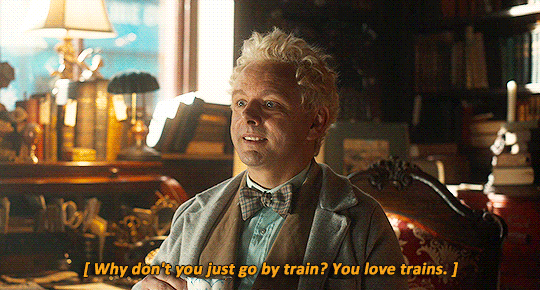
Within grice though is also, of course, the word rice...
...and ice, which replaced fermentation in fish preservation...
...and, so, back at the sushi we arrive. 🐠
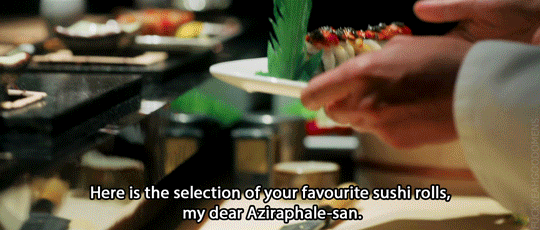
Meta the Ask references for anyone who is wondering what we're on about regarding fish:
#ineffable husbands#good omens#crowley#aziraphale#aziracrow#good omens meta#good omens 2#ineffable husbands speak#etymology
28 notes
·
View notes